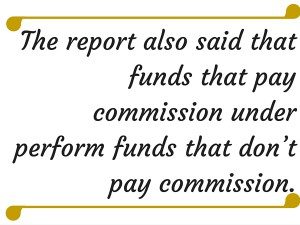Mutual funds have hidden fees: report
July 2, 2015

Investors suffer because of mutual fund fees. Now we have another research report that explains some of these failings.
The Canadian Securities Administrator (CSA) published the Mutual Fund Fee Research report in June. Our interpretation of the report is that mutual fund companies and those investment salespeople who sell mutual funds should be doing a better job.
The CSA is responsible for the securities regulations of all provinces. Their website says the CSA protects Canadian investors from unfair, improper, or fraudulent practices and fosters fair and efficient capital markets.
In other words, the CSA is there to protect you, the individual investor. Its observations should be an embarrassment to the many firms that do not have a client-friendly method of charging fees.
The report says that higher embedded commissions stimulate sales. Because mutual funds are sold, that simple comment says that there is more effort selling funds that pay higher sales commissions.
The investment services industry is a business. The motivation of a business is to make a profit. That is a concept that virtually all investors can accept.
Embedded fees is just a polite way of saying the investor is charged a fee without being aware of that fee. Virtually no investor would think that is fair. And it is not.
Another finding was that sometimes investment recommendations favour investment options that pay the salesperson higher commissions. This revelation is not new.
In a previous column, we reviewed the findings of a University of Toronto professor whose research found a direct correlation between the number of mutual fund commissions and the number of sales of those mutual funds.
Funds that paid higher commissions were sold more often than funds paying a lower commission. Her breakthrough research was based on 20 years of data from the United States.
The report also said that funds that pay commission underperform funds that don’t pay commission. The reason is that commissions, which are paid to the selling firm by the mutual fund company, are a cost that is added to the cost of you owning that fund.
Other research we have reported in a previous column explains this. The mutual fund database from the University of Chicago showed there is a direct correlation between mutual fund fees and mutual fund performance.
High-cost funds have poorer returns and low-cost funds have better returns. The single best indicator of mutual fund performance is fees.
Forget all the mutual fund company self-promotion. It comes down to fees. It is that simple.
There is one more piece of research from the CSA report. We saved the best for the last.
When embedded fees are absent, advisors recommend lower-cost investment products. Unfortunately, that final point is unpleasantly revealing.
Take away the motivation of a hidden commission and advisors do have the ability to do the right thing and recommend investments that are less expensive.
Less expensive options have demonstrated the ability to get higher returns, which is all the investor asked for in the first place.
Like it or not the practice of charging hidden fees in mutual fund sales is a reality. The evidence strongly shows this is not good for the investor.
Our recommendation is for all investors to fully understand their mutual fund hidden fees. Seek out low-cost mutual funds and you will have a much higher chance of success.
RELATED ARTICLES
